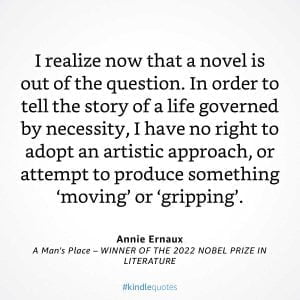A Man’s Place by Annie Ernaux
Apart from writing, reading is one of the things I have committed to doing a lot more. I have a particular liking for Novellas. And when I came across ‘A Man’s Place’, I had to add it to my reading list. Happily, I decided to take a break from writing and read this book this morning. It is a quick read, packed with emotion. It was interesting how the author was careful of the thoughts and memories she was sifting through whilst not wanting to fictionalise the story of her father’s life and death.
I was immediately struck early in the book when she writes, ‘In order to tell the story of a life governed by necessity, I have no right to adopt an artistic approach.’
I have attached the full quote from the book below.

This attention to the process stopped me, rather like inhaling a deep breath, before heading back down the path I was on. It framed how I should continue reading the book.
The book starts and ends with her father’s death. The in-between explores his complicated relationship with society and class, which extends to her relationship with him as she grows up, travels, goes to college, marries and has children.
What happens when a father wants more for his child? When he wants them to transcend their financial and social situation. But in so doing, it sets down the foundations for a wall that they both will, with complicity, build together.
Standing astride each other, connected by blood, separated by social structures and complicated by the inferiority each party brings to the table. The embarrassment of a mispronounced word, an inability to spell, the silence shared by the uneducated with the educated. Her father’s history is shaped by time and place—the advantages he created for his daughter while simultaneously losing her.
She explores their history with distance, respect, tenderness and understanding, leaving the reader questioning why do social structures create Achilles’ heels in all of us.
The book finishes all too quickly, punctuated to perfection with a simple example of human interaction. At a supermarket checkout, the author has a chance encounter with a former student she taught. The student explains she is a checkout assistant because community college didn’t work out. The author is vaguely familiar with the student’s details. And so two passing ships meet, leaving behind a complicated experience of where we all think we fit into this constructed society and the uncomfortableness we have with it.

0 Comments